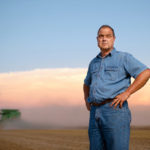Farmers, Ranchers and Fishers – “There was nothing for those who began it, only the future.”
Owen Franklin Dornblazer was the 11th person to join The Farmers Educational and Cooperative Union of America in 1902. He lived to the age of 94 and was active in organizational and membership work until the final few months of his life. At age 85, addressing the 1926 NFU convention, he said, “There was nothing for those who began it, only the future.” I believe that statement still rings true today.
So, what about our future? Over the years, farmers and ranchers have struggled with tough times, but today’s free-fall of the rural economy is unprecedented. Commodity prices, as a percentage of parity, are at an all-time low. No, this is not the first farm crisis, but the debt spiral is spinning faster than a Kansas tornado. Yes, there are economic models that can produce grain, livestock, fruits, vegetables and milk at a very low economic cost. But can those prices support a family, a rural economy or a community? No. We are in the throes of an economic system which exploits, extracts and steals not only the wealth of the land, but the dignity of the human being.
As farmers, ranchers and fishers, it is important to remember that:
- We are not called to be the top producer; rather, we are called to practice good husbandry.
- We are not called to make two blades of grass grow where before there was only one; rather, we are called to be good stewards of the earth and her gifts.
- We are not called to be a master or a slave to technology; rather, we are called to be tillers and toilers.
- We are not called to isolation; rather, we are called to be good neighbors and cultivate connections.
- We are not called to plant in laser-straight rows; rather, we are called to think straight.
- We are not called to “feed the world”; rather, we are called to create and re-create communities.
- We are not called to be winners or losers; rather, we are called to cooperate, not compete.
Now, as in the past, the question before us is, “How do we right the ship?” At its core, the answer is the same as it was in 1906 when James West, the president of the Indiahoma Farmers Union said, “Let the words be: Agitate, Organize, Educate and Cooperate.” The core belief in the power of organization has served as a touchstone throughout Farmers Union’s history. Charles Barrett, who served as the president of National Farmers Union from 1906-1928, had an innate understanding of this. He spoke and wrote eloquently on the topic. Here is an excerpt from one of those masterpieces:
I am going to give you my solution for your agricultural problems. But since these truths are bearded with age, a few will recognize their value. The key to the solution of nearly every farm problem lies in self-help. What does that mean? It means first; cooperative organization for protective and educational purposes; second, cooperative organization for business purposes, and third, cooperative organization for political purposes.
We must begin with cooperative organization for our own protection. That kind of organization must have roots in the local community. The communities, through their locals must have a strong state-wide union; the states must have a strong, effective national union. You have such an organization in the Farmers Union. Our organization has weathered twenty-two years of storms. It has been in the midst of the fight when the fight was the hardest.
Farmers Union has a deep and rich heritage. We have created communities through the spirit of cooperation. We have embraced and promoted education for all people. We have worked at the local, state, national and international levels developing cooperative enterprises and legislation. We must continue to strive to create opportunity for everyone, and empower others to create communities. Let us draw strength, hope and energy from the times and trials of our organization’s 115-year history, as we move forward to our future.

Tom Giessel
Tom Giessel is a farmer in Pawnee County near Larned, Kansas. He raises wheat, corn, milo, and alfalfa in partnership with his brother, Jay. Tom has been active in Farmers Union all of his life, serving as vice president of the Kansas Farmers Union for nearly two decades. He has also served Farmers Union on a national level as chairman of the policy committee, testified at congressional hearings, and participated in the American Farm Project. He currently serves as Honorary Historian for the National Farmers Union and President of the Pawnee County Farmers Union. Tom is active in his community and local church; he serves on the Board of Directors for Ogallala Commons, which is a community resource development organization. He is also the president of the Public Building Commission of Pawnee County. In 1972, Tom graduated from Fort Hays State University with a B.S. on Geology. He and his wife, Sheryl, have three grown children.